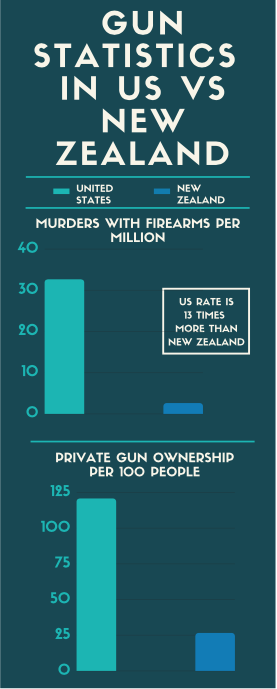UNSIGNED
The deadliest mass shooting in modern New Zealand history occurred at a Islamic Mosque in Christchurch killing 50 people and injuring 50 more. Immediately after the attacks, New Zealand Prime Minister Jacinda Ardern announced “Our gun laws will change, now is the time … People will be seeking change, and I am committed to that.” New Zealand’s Parliament voted 119-1 to take legal action and ban semi-automatic weapons and assault rifles.Their government has made more progress in a month’s time than the United States has made in 20 years.
Many Americans who are used to little to no change in gun laws after mass shootings, are shocked by the quick government reaction. New Zealand has corrected gun laws to ensure better security of its people after every mass shooting in their country, the last major reforms occurring after the Aramoana massacre in 1992. Whereas, 103 mass shootings have taken place in the United States since 1990 each followed by pushes for change and no results.The United States has the weakest gun laws in the developed world, and considering the elimination of gun rights is debated in the aftermath of every mass shooting constitutional right and organizations such as the NRA who resist substantial changes.
In New Zealand, citizens do not have any constitutional rights to firearms, and considering 15,000 of the 1.2 million registered firearms are labeled semi-automatic weapons, they have a significantly low crime rate compared to the United States. However, they are subject to an extensive background check in order to obtain a license, which will then allow them to purchase a gun.
With no rights to a firearm, laws and bans can be put into effect with more ease than in the United States, which currently only guarantees a swift and easy background check in order to obtain a gun. Purchasers are asked to complete a form in which they are asked for their name, address, place of birth, race, and confirmation of citizenship. Their information is then entered in to a database called the National Instant Criminal Background Check System (NICS) which scans through the National Crime Information Center, the Interstate Identification Index,
and the NICS Index for indications of any record that would disqualify the customer to purchase a gun. In many cases, however, crucial records are not entered in the database which allows convicted felons to legally obtain firearms with no red flags.This crucial mistake has occurred numerous times, including the shooting at the First Baptist Church in Sutherland Springs, TX. The shooter, Devin Patrick Kelly,
slipped through the cracks in the system simply because he was sure to avoid checking the box that would disqualify him from obtaining the six firearms he used to kill 26 victims in Nov. 5, 2017. Although it will be hard to ban semi-automatic rifles, only 1.2 million civilians have firearms which is easier to monitor compared to the population of civilians in the United States who own firearms.
While the second amendment cannot be changed and will always be a right to Americans, people should push for stricter gun laws, intensive background checks, and better administration of gun licenses to eliminate holes in the process of obtaining firearms. Implementing these regulations will aid in the further prevention of mass shootings in the United States.

